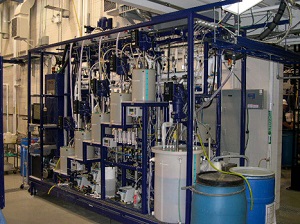911 Metallurgy can provide you with all your hydrometallurgical service needs, from testing to production. We offer a comprehensive range of test services including bottle roll testing, column leach testing, pressure leach testing, bioleach testing, albion process testing, electrowinning testing, solvent extraction testing, and so much more. Our experts know how process all ore types, ranging from precious and base metal ores (Au, Ag, Cu, Ni, Co), to platinum group metal ores (PGMs), to uranium ores, to rare earth elements (REEs). 911 Metallurgy can provide testing both at the laboratory and pilot scale, offsite and or onsite. Using the data generated from testing, our experts can help you design your process, select equipment, and help you get into production. We will provide the experience and service you need to minimize risks and make your project a reality.
Column Leach Tests
Column leach tests or column percolation leach tests, are primarily used to simulate heap leach conditions. 911 Metallurgy has comprehensive column leach testing and heap leach experience, and can provide you with guidance and service to meet your projects needs.
What is heap leaching?
Heap leaching is a common mineral processing technique, used to extract precious metals (Au and Ag), copper, uranium, and other constituents. First, ore is stacked onto an impermeable plastic liner. Then, a solution containing reagents, specific to the targeted constituent or constituents, is dispersed using a drip or sprinkler system. The solution percolates through the heap, extracting constituents by dissolving them. The enriched solution, called the pregnant leach solution or PLS, is then collected and processed to extract the constituent of interest.
Already in production, but need help?
No problem, 911 Metallurgy can help you solve problems with your heap. 911 Metallurgy can provide comprehensive on-site or off-site services.
What are column leach tests?
Column leach tests are used to evaluate if a constituent or constituents can be extracted from a solid, under simulated heap leach test conditions. First, the solids are sized according to the needs of the test work. Then if needed, column test feeds are agglomerated to improve the permeability and strength of the stacked feed. A leach solution is then applied to the top of the column, at a constant flow rate. As the solution percolates through the column it dissolves and concentrates constituents into a pregnant leach solution (PLS). The PLS is collected daily, to track reagent consumptions, interim constituent concentrations, and to determine final constituent mass balances and recoveries. Tests are often run until pregnant leach solution constituent concentrations approach detection limits, to determine maximum recoveries, with leach cycles ranging from months to years.
Need help managing or designing your testing program?
911 Metallurgy has years of experience managing and designing heap leach testing programs. Our specialists will walk you through the entire process from preliminary testing (e.g. ore characterization and coarse bottle roll tests), to geotechnical testing (e.g load permeability testing), to optimization (e.g. crush size and reagent), to extraction (e.g. solvent extraction), to design.
Bottle Roll Tests
Bottle Roll Tests
Bottle roll tests are widely employed in metallurgical and environmental testing. 911 Metallurgy has extensive bottle roll testing experience and can provide you with guidance and service to meet your laboratory testing needs.
What are bottle roll tests?
Bottle roll tests are used to evaluate if a constituent or constituents can be removed from a solid through dissolution. Basically, known amounts of solid and liquid are added to a bottle, to create a slurry. The slurry is then gently agitated and sampled at scheduled time intervals, to track reagent consumptions, interim constituent concentrations, and to determine final constituent mass balances and recoveries.
Metallurgical Applications
In metallurgical testing, bottle roll tests are used to determine a materials amenability to leaching a specific metal or metals. Tests can be run at coarse feeds to evaluate heap leaching amenability, or fine feeds to evaluate conventional mill leaching processes.
Reagents specific to the type of metal or metals targeted are added to the bottle roll test solution. Solutions can vary from acid, to neutral, to basic. Cyanide is typically used to extract precious metals, such as gold and silver. Whereas, solutions containing sulfuric acid are often employed to extract copper.
Don’t know what conditions or reagents to use?
No problem, 911 Metallurgy specialists can provide you with the knowledge you need, even for less common reagents and processes.
Environmental Applications
In environmental applications, bottle roll tests are used to characterize what constituents might impact the environment when a solid material is exposed to a solution. Particularly, if the constituent will become harmful if it migrates into a source of water, such as a river, lake, or aquifer.
Do I need environmental testing?
911 Metallurgy specialists have extensive experience with Environmental Regulatory Agencies and can help you define your projects environmental testing requirements.
